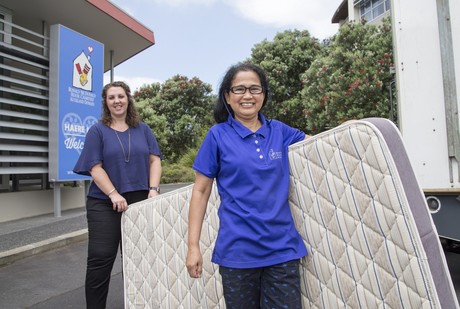Recycling Ronald McDonald's mattresses

Management at Ronald McDonald House in Auckland will sleep easy tonight knowing 43 mattresses from the charity are being recycled rather than thrown in landfill.
The last of the mattresses were collected last week by resource recovery specialist 3R Group as part of its Rebound mattress recycling program. According to Rebound Program Manager Sarah Clare, 3R was contacted by the charity and asked if it could help responsibly dispose of its old mattresses, which were due to be changed for new ones.
Rebound aims to be a product stewardship program that will make the practice of sending mattresses and bases to landfill a thing of the past. Though it is still in the project phase, it has conducted successful collection and recycling trials. According to Clare, the free collection and recycling of the Ronald McDonald House mattresses was done as a social responsibility initiative.
“Ronald McDonald House supports so many families by providing them with a safe haven during times of immense stress — we were really pleased to help them out,” said Clare.
“The added bonus is that the mattresses get dismantled, in this case giving business to a local community trust, and the components recycled, rather than just going to landfill.”
Ronald McDonald House Charities New Zealand Chief Executive Wayne Howett said the charity works to embed environmental practices into all aspects of its operations, including reducing, re-using and recycling waste wherever possible.
“We are grateful for 3R Group’s support in helping us to achieve this, by offering a collection service for our old mattresses. This makes the process very convenient and allows us to be sustainable, while ensuring the families who stay with us are getting the vital rest they need in comfortable, clean and safe beds.”
Every year New Zealanders throw away an estimated 300,000 mattresses and bases, despite the fact over 70% of the components can be recycled. They cause health and safety issues for landfill operators, who find them difficult to deal with, and are a long-term problem in landfill — a particular nuisance for future methane gas extraction, according to Clare.
There is, therefore, a clear need for a nationwide product stewardship program, said Clare, which would allow consumers to responsibly dispose of their unwanted mattresses and bases.
Upcycled mattresses to become sustainable insulation
Researchers have turned old, unwanted mattresses into safe and sustainable building insulation...
Council recycling service tackles difficult waste disposal
The service is specifically aimed at helping households dispose of items that cannot be placed in...
Greener method recovers critical metals from spent batteries
Researchers have developed a sustainable method to recover high-purity nickel, cobalt, manganese...







